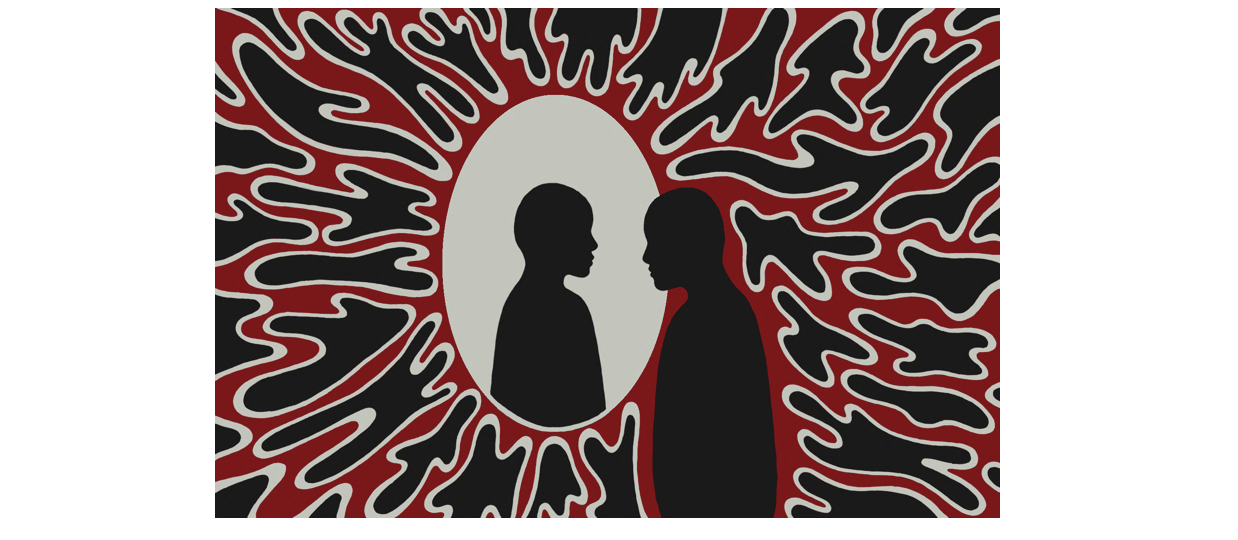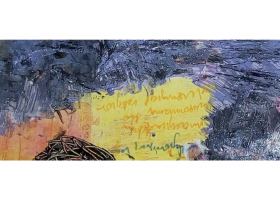Content warning: mental illness.
[Have you ever walked into a house of mirrors?]
When I was 16, I started seeing a psychologist. Her office smelt like fake plastic pearls, like the ones everyone crazed over for a while and used to water their plants with when they went away, the ones we collected and squished until they crumbled over our fingertips, leaving the stickiness of their odor under our nails. Barrio de Salamanca smells like that in the late afternoons of August, and I remember wondering why sizzling concrete and a mental health professional would pick the same perfume.
I think I only saw her four times; lying to her didn’t prove to be as entertaining as I originally imagined, too easy a game to make the trip downtown worth it, too dangerous a practice to allow myself to continue it. At the time, the flesh of my mind was strung between the desire to be okay– whatever that meant–, and the temptation to indulge in a form of self-hatred I knew all too well. An internal tension dominated my being, pulsing so hard at times I could have sworn my ribcage would shatter. It wasn’t a new feeling, just a different note of one same thumping rumble.
Did you not know that dichotomies can make a noise?
I was stretched between the either and the or. I saw two options in front of me and I wanted them both: I was terrified that getting better would mean losing who I was, yet enthralled by the possibility of who it would allow me to be. I didn’t see a spectrum of options in between, only an unsatisfying void that wouldn’t quite fit with who I was supposed to be. Granted, my illness played a role in this mentality, but it didn’t determine it. It had always been there.
[According to American movies, a house of mirrors functions in a maze-like way. You have to find your way out while playing around with different reflections of yourself.]
When we think of the concept of identity we tend to frame it as an additive process. We take Crenshaw’s intersectionality and all the societal labels we can grasp– race and gender, sexual orientation and class, et al and et al– and mentally sketch intersecting circles, seeking to map out how belonging to an undefined number of social groups informs an individual’s lived experiences. Yet, in our continuous effort to acknowledge the symbiotic nature of identity, to validate the most nuanced of individual existences, we sometimes overlook the most complex aspect of what it means to be a self: the struggle to harmonize all the seemingly opposing elements that make one, oneself.
The internal dichotomies that flourish when the mind feels trapped between and either and or.
When I was 6 and my brother was 4, we both started learning English. Bilingual kids are often assumed to have grown up in a household where the two languages are interchangeable– see, Call Me By Your Name–, where there isn’t a linguistic gap between parents and children, where the language is never going to be an obstacle in the relationship between the two.
But my mother doesn’t speak English.
Yes, she can read English and understand what a text is getting at, yes, she can have a basic conversation in English about the weather or someone’s day but, no, she can’t speak English fluently in the way my brother and I can, no, she can’t quite follow the Spanglish my brother and I use to communicate with each other– and that, all of that, infuriates her. The reality of my relationship with my mother is constrained by the limits the Spanish language can afford us.
Yet the reality of my individual experience has been profoundly shaped precisely by what I thought lied outside the domain of the Spanish language.
[In a house of mirrors, from what I have been able to gather, you sometimes end up simultaneously staring at various reflections of yourself.]
In Pure Heroines, one of the essays in Trick Mirror, Jia Tolentino examines her personal relationship with female protagonists of both childhood and teenage novels– the influence those characters had on her perception of the self, on who she wanted, on who she feared she’d become. Her piece, besides making me marvel at her brilliance and at the deep-seated truth of her overall reflection– I won’t do it an injustice by trying to bluntly summarize it– forced me, for the first time in years, to think about the books I read when I was growing up. Most of them, regardless of whether I was reading them in Spanish or not, were originally written in English; their content, their cultural background was sturdily anchored in the Anglo-American way of living. They spoke of cucumber and ham sandwiches and Thanksgiving or Boxing Day, of playing cricket or becoming a cheerleader, of presumptuous universities in the East Coast or the South of England, of…
…of unimportant things, truly. But of things, of realities that, at the time, felt like the epitome of the ideal way of living.
That’s the thing about the constructed superiority of the English world and, by extension, of the English language– society has spent so much time enshrining English as a standard for the Universal, as the bar that determines if something is good enough, worthy enough, important enough, that we sometimes forget that planet Earth doesn’t spin around it. We forget that being in English– whatever that means in a given context– is not a necessary condition for perfection.
I most definitely did.
I grew up reading those books, those stories, and wanting so badly– so badly– to be a part of them, to be a character in London or New York or the English countryside– I wonder why now– or the Bay Area, that I started rejecting what my immediate cultural background could give me. Spain, the Spanish language, were only intermediate-and-inferior stages to the ultimate success of running away to an English speaking country. I refused to learn the traditional dance of the South, sevillanas, because it felt naive to grant it any importance; I insisted on listening only to American music, to make a point out of the niche indie-rock, r&b-neo-soul bands my classmates had never heard of before; I criticized traditional dishes and sought recipes I knew my favorite characters would approve of, from curries to dals to baba ganoush and hummus– see the irony? None of those are English nor American dishes.
I didn’t feel Spanish, and I told everyone so.
I didn’t feel Spanish even though I loved post-Civil War literature and surrealist art, I didn’t feel Spanish despite having the urge to listen to flamenquito whenever I was in a good mood, I didn’t feel Spanish in spite of having been born there and having lived there my entire life, despite not knowing anything else. I had no religious connection to our traditions, no sense of belonging to the place I grew up in, no interest in constructing a life in my home country, no desire to stay when I had the opportunity to escape. I didn’t feel Spanish because I felt like I shouldn’t, because I had been raised to be the best version of myself– a lot of fun unpacking can be done when it comes to my inherent competitiveness–, and believed being English, whatever that meant, was better.
I didn’t feel like I had to feel Spanish because I was convinced that I could shed off that part of my identity; I was convinced that if I didn’t wear my Spanish-ness as a crown, no one would point it out.
[If the reflections in a house mirrors show versions of yourself you know not to be real, but the person next to you can still see right in front of their eyes, can you negate the fact that they are still a valid take on reality?]
In my first year of University, a boy tried to flirt with me while telling me about the olive fields his family owned; he naturally assumed, and told me so, that as a Spanish person I would love olives. In my first year of University, a boy called me Mediterranean princess and tried to convince me to go home with him. In my first year of University almost everyone I met told me they had been to Barcelona and/or Madrid and asked me if those cities were in the South. In my first year of University, almost every single drunk person I met insisted on practicing their GCSE level Spanish with me.

In my second year of University, a boy I slept with told me I didn’t understand how exotic and idyllic the coast of Spain was. In my second year of University, I had multiple friends laugh at me when my pronunciation in English wasn’t correct, or ask me to repeat words they had understood, simply for their own comedic interests. In my second year of University, I realized no one would ever pronounce my name correctly and that this was something I was expected to accommodate for, almost as if it were my own fault. In my second year of University, I was told I looked exactly like what Spanish people look like.
In my third year of University, I realized I couldn’t peel my Spanish-ness off.
[I have always wondered if people get dizzy while strolling around inside a house of mirrors. When do too many reflections actually become too many?]
The realization that the majority of those around me saw me not simply as a person, but as a Spanish person, struck the chords of my rumble of inner dichotomies harder than ever before. I suddenly wanted to defend my Spanishness from all the stereotypes and Anglo-centric assumptions, but still desired to keep a degree of separation from my origin, from bullets that could bounce off the walls of my explanation and hit me in the chest.
My selfhood felt like a walking carcass, being held together by tiny pieces of tape. I felt too Spanish at University, yet knew I wasn’t Spanish enough at home.
“If neurotic is wanting two mutually exclusive things at one and the same time, then I’m neurotic as hell. I’ll be flying back and forth between one mutually exclusive thing and another for the rest of my days.”
I was Esther Greenwood in The Bell Jar. I wanted to be Spanish and not-Spanish-enough, I wanted to pull my skin so that both would be satisfied, so that the thumping dichotomy would make all of my hairs stand.
I still do.
I still want to offer my Spanishness on a silver platter, and I still reject candidly the thought of being a stereotypical Spaniard.
Recently, I have come to realize that my veins have always been laced with opposing tensions, that my experience negotiating my identity on the most superficial level has simply served to make this fact more evident. I want someone who will be completely independent of me but who will love me so profusely that they’ll write my name on the water; I want to be the busiest of the busy bees, but also to live in a cave in silence and away from the purposeless stress of society; I want to be cool and cold, yet warm and approachable too; I want to be a relaxed artist and the politician who makes a change; I want to be here and I want to be there.
I don’t want either-or; I want either and or.
You see, tension is a balance maintained in an artistic work between opposing forces or elements.
Who’s to say we can’t start applying this to ourselves?
[In a house of mirrors you always find a way out.]
art by Tia Merotto.





Absolutely soul crushingly Beautiful.